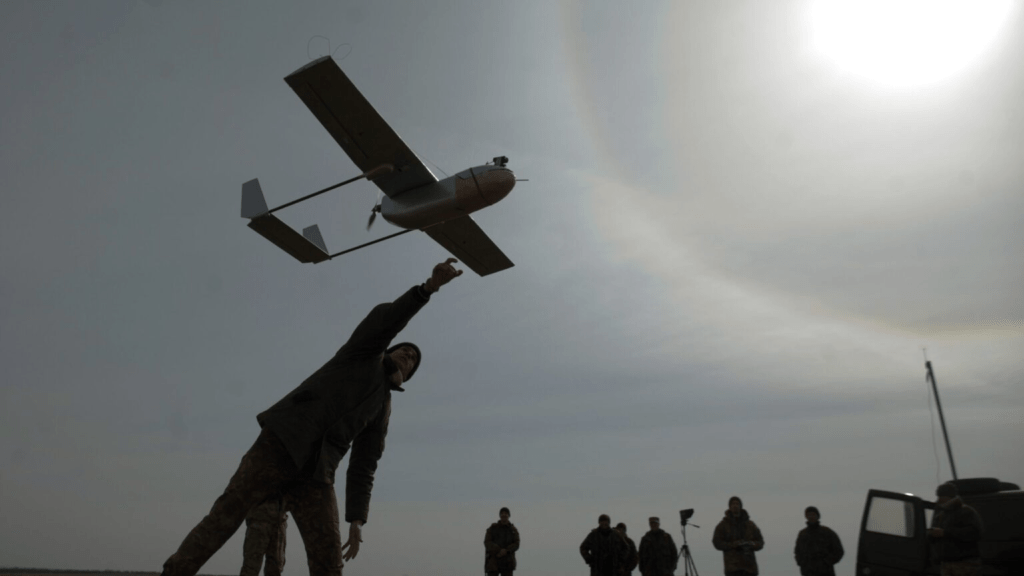The French military recently narrowed a field of 19 competitors to two in a race for hundreds of small, deadly UAVs.

PARIS — After years of reticence about the use of small, cheap suicide drones in combat, the Ukraine conflict has convinced the French military it’s a capability troops cannot do without in a future conflict.
Earlier this month the French Ministry of the Armed Forces announced it had narrowed down a competition for the production of such UAVs from 19 competitors down to two in its Colibri (Hummingbird) project. Colibri was launched last May by the nation’s Defense Innovation Agency (AID) in partnership with the French DGA procurement agency.
France hopes to have a “base of 1,800” of the remotely-controlled munitions, Armed Forces Minister Sébastien Lecornu told Le Figaro last month. In late January, he told French lawmakers that France had “fallen behind” in developing the new type of weapon that is clearly here to stay. He said the plan was to have “thousands” of these types of munitions by 2030. “That’s part of the lessons learned from Ukraine,” he explained.
The two teams moving on in the Colibri competition are MBDA/Novadem’s proposal based on a rotor-blade drone bigger than the NX70 that Novadem has already delivered to the French Army, and Nexter with a drone-manufacturer, whose name was not released at its request, with a fixed-wing drone solution.
The idea is that both consortia will fly demonstrators before the end of this year so that the AID and the DGA can “evaluate the pertinence of these industry proposals vis-à-vis the operational requirement,” according to a statement issued by the AID.
The MBDA/Novadem proposal, called Sphinx, would be most useful in urban or more enclosed spaces while the Nexter project based on a surveillance drone is better suited for use in more open environments, the AID said. Nexter’s munitions unit, Nexter Arrowtech, will develop the munition that will be carried by a drone made by the anonymous drone-manufacturer. Nexter Arrowtech proposed a “product that is absent today from the French arsenal. This innovative operational concept will carry a new, controlled fragmentation warhead,” Nexter said in a statement.
AID and the DGA launched the Colibri project to quickly find French ideas for remotely controlled munitions that would be cheap, easy to use and able to neutralize a light vehicle within five kilometers (about three miles) from the drone’s take-off point. The French agencies also want the drone to be able to stay aloft for at least 30 minutes, that it be secure from being interfered with, that it be small enough for a soldier to carry and that the consumable’s recurrent cost should be less than €20,000 ($21,673). In comparison, the cost of a laser-guided bomb ranges from €50-€200,000, according to an annex to the Request for Proposals on the AID website.
As one industrialist, who spoke on the condition of anonymity, told Breaking Defense in a telephone interview “the idea is to develop both fixed-wing and rotor-wing drones specifically designed to carry an explosive charge, rather than buying an off-the-shelf drone and modify it so it can carry a grenade.” The person insisted that “in the French concept of use there will always, always be a man-in-the-loop,” meaning no automatically deployed munitions.
But Colibri isn’t the only remotely controlled munitions project underway for AID and the SGA. Another, named Larinae (Gull) is intended to take on armored vehicle targets – though not tanks — within 50 kilometers (about 30 miles) from takeoff. The DGA wants the system to be able to fly for at least an hour and it needs to be robust and secure from any kind of interference.
The aim is also that the recurrent cost of the platform be less than €200,000 ($216,600). Though some French media have reported two finalists for that competition, no announcement has been made and a source familiar with the competition said those reports were premature.
Original Article: https://breakingdefense.com/2023/03/france-races-for-small-suicide-drones-after-seeing-effectiveness-in-ukraine/




